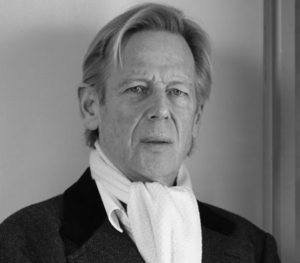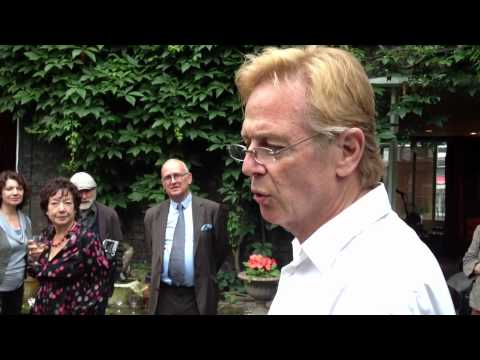Interview by John Wisniewski
John Wisniewski: At 21, Duncan you were given a column in The Spectator. Could you tell us about this?
Duncan Fallowell: I had no direct connections with the Spectator, but wrote to them on a hunch just as I was about to leave university and asked for a rock column. They said yes but it would be called pop. I was terribly surprised.
John Wisniewski. Any favorite authors?
Duncan Fallowell: My work is surely an aggregate of micro-influences which is twisted into something only I could have written. Perhaps I am part of a tradition of tragi-comic candour which begins with Petronius in Satyricon, went underground in the Dark Ages and Middle Ages, began to resurface in the Renaissance and burst forth in England in the 18th century with Laurence Sterne and in 19th century Russia with Gogol. I’m rereading William Burroughs with enormous delight and renewed amazement – he’s part of that thread too. The only living writers I love are Annie Proulx and Patrick Modiano. I love beautiful, vivid, incisive, high-performance prose, elitist but tripped out – so love Conrad, Cioran, Marquez.
John Wisniewski You were involved with the German rock group Can for a while. Could you tell us about this?Duncan Fallowell: Always enjoyed all sorts of music but my first passion was for classical music – such a huge realm! I didn’t see rock as an art form until it started to move out and link up with avant garde art and electronic music. I’m the only person in the whole world who bought the first albums of the Velvet Underground, the Stooges and Can upon their release. I tripped to Can’s Monster Movie in my last year at university. Musically they were more ambitious than the Velvets. The VU were only important for their first two albums – after they left Andy Warhol they became just another rock act (loved Bowie for himself – but he destroyed Lou Reed and Iggy). One of the reasons I wanted to get the rock column was to be paid to visit Can in Germany which I did almost at once. I clicked with them and they became part of my work and my life.
John Wisniewski Any rememberances of John Betjamen and william Burroughs?
Duncan Fallowell: My cultural interests across a broad front exploded with the arrival of adolescence. I soon became aware of two reciprocal processes within me: an intense fascination with the past and a drive into the future, to make it new in Ezra Pound’s phrase. This was 1960s London. John Betjeman was the principal figure in the Victorian Reappraisal and I decided to interview him for the school magazine and we became friends. In those days there wasn’t the chasm between the generations which has become one of the sicknesses of contemporary life. John also knew many of the personalities involved in 1920s Modernism, a movement I was also mad about. William Burroughs I got to know at the beginning of the 1970s because he lived in the flat below that of a friend of mine, just off Piccadilly. His writing is more extravagantly modernist of course, but he too was deeply involved with the past – Bill’s boyhood in St Louis was a vital part of his subject matter until the day he died; and he was a magnificent prose writer in the traditional sense, when he chose to be. So nostalgia and futurism – there is no important art without both. The artist must wrestle with both. The arts are not iconoclastic. Iconoclasm is politics which is the opposite of the arts.
John Wisniewski Could you tell us about writing your memoir “How to Disappear”?
Duncan Fallowell: One day I was looking over my unpublished work and saw I had a number of quite ambitious biographical texts which were unfinished because their subjects had disappeared. Their trails had faded into the forest and so their stories could not be concluded, had vanished into mystery. I realised that this was the most tantalising feature of these texts and that they would cohere on that basis. The result was How To Disappear.
John Wisniewski: Could you tell us about writing your April Ashley biography?
Duncan Fallowell:I’d known April since my teens and she often asked me to write her life story. So when I burned up in London at the end of the 1970s I moved to Hay-on-Wye to do it. April had moved there when she too had burned up in London, some years earlier. We were both good friends of Richard Booth who’d already started the book business in Hay, which was still in its early, wildly eccentric phase; so the place suited April and me very well. I told April I could never be a ghost writer and only agreed to do it if my name came first as author. She agreed. She had the title set in stone: April Ashley’s Odyssey. I didn’t want to write it in the third person, so interviewed her exhaustively, researched widely, and took all the material to a flat in the Hay workhouse, which I’d rented for the purpose, and wrote it pretending to be April. She was already well into her exiled duchess manner, so I took that and added an educated underpinning. Unlike William Sharp when he wrote as Fiona Macleod, I didn’t write in drag, and I’ve never wanted to change sex. I love having a cock. Funnily enough, William Burroughs had met April when he came to London in 1965 and stayed in Geoffrey Bennison’s gay hotel in Earl’s court; and after reading the book he wrote to me and said ‘You’ve certainly given her a voice.’ The word voice was underlined on his rickety typewriter – his letters looked like concrete poetry. They often talk of filming the April book but it hasn’t happened yet.
John Wisniewski You have written a few travel memoirs, Duncan. What attracts you to traveling and writing about your experiences?
Duncan Fallowell:If asked to describe life I’d call it an adventure. So it was natural for me to move around, noting my experiences. I am never without a notebook near to hand. Many of my best ideas come travelling between places. At the moment my life is mostly divided between London and the Welsh border. Driving between the two is wonderfully cleansing and fresh ideas constantly appear en route. I must have a vagabond soul.
John Wisniewski .Duncan, you were closely associated with the New Journalism Movement. Could you tell us about this?
Duncan Fallowell:One of the problems for any writer trying to push the limits is how to earn a living from it. The New Journalism, which married reportage (yes, in the French sense) and autobiography, in a zesty cocktail of literary ambition, erased the barrier between journalism and literature and provided one solution to that problem. The obvious names were Tom Wolfe and Hunter S.Thompson, the former crashing through the limit in straight magazines, the latter emerging from the underground press; but the pioneer was Cyril Connolly in the 1930s. Connolly was an intensely literary man who had to survive on journalism because he couldn’t manage the architecture of writing books. So his journalism broke all the conventions, was obviously modernistic, and often wildly funny.
The reason I have never had a boss and have always been a free-lancer, is because, when I began, the New Journalism was in full flight and it allowed me to do my thing in many different journalistic spaces. I didn’t have to be imprisoned. The girlie magazines especially – Playboy, Penthouse, Playgirl etc – paid very well indeed for edgy work – the New Journalism suited their anti-uptight ethic. It wasn’t easy surviving this way, I lived on my nerves a lot of the time; and it didn’t go on for long, but oh god it was wonderful while it lasted, being sent to Monte Carlo or Mexico City or Berlin and being able to write whatever one thought was the best possible thing to write in the circumstances. Increasingly in the 1980s the advertising industry reasserted control, the press straightened up into corporate product again, and the maverick author was out the door. I survived for a while doing celebrity interviews for the glossies, but it became impossible by the 1990s to publish anything original in the straight press (as opposed to the little magazines). All that was left for a feral creature like me was book reviews and the occasional opinion piece. Fortunately some people died before too long, and left me some money, so I could carry on being an avant garde author.
John Wisniewski: Any new writings and projects?
Duncan Fallowell: This year I published a new novel called London Paris New York – straight into Kindle because of the covid virus. Next year I hope to publish another novel by a more traditional route – it’s finished and semi-colon perfect. I’m also issuing Twentieth Century Characters electronically for the first time in the coming weeks; and have a second collection of interviews ready to publish as a follow-up. The book I’m writing currently is a memoir of the 1970s. I’ve written a third of a million words so far in rough draft and still have a little way to go, so it will be a trilogy. For a change, publishers are showing proper interest in this, probably because my last memoir won the PEN Ackerley Prize and they are so sheepish. Veracity and candour – extreme candour – are my guides. I resisted doing it at first, I knew it would be a big thing; and did I want to confront my youthful self? But a publisher said he thought it would be marvellous and I should do it while I had the energy. Once I started I found it strangely moving, talking again to dead friends, dead loved ones, and I cry from time to time when writing it. It feels like this book is fulfilling my debt to the world. Instead of my insisting what I want to do, it is what they want from me – okay, I understand, you’ll get it.
I’ve also started making experimental art films, taking much liberty. It’s wonderful transferring to another medium. I’m currently working on one about Andy Warhol which has grown out of a taped interview I did with him at the Factory in 1983 – it’s such an odd interview, I am so aggressive, I’d just come from drinking with Johnny Rotten at the Warwick Hotel, and Andy is so sweet. The film is getting very long of course. I’m doing the music too, my Can experience finally being turned to account.

ABOUT: Duncan Fallowell is a novelist and travel writer. Born in London in 1948, he graduated from Oxford in 1970 and at the age of 21 was given a pop column in the Spectator. During the 1970s he travelled extensively in Europe and Asia, collaborated on the punk glossies Deluxe and Boulevard, and began working with the avant-garde German group Can. Later he lived for substantial periods in the south of France and Sicily. His first novel was published in 1986 and first travel book in 1987. In the 1990s he was often in the English countryside and also at St Petersburg where he wrote the libretto of the opera Gormenghast which was first staged in 1998. He has since travelled to New Zealand, spent time in Paris, but remains based in London. In 2012 Fallowell was awarded the PEN Ackerley Prize for Memoir and Literary Autobiography.

